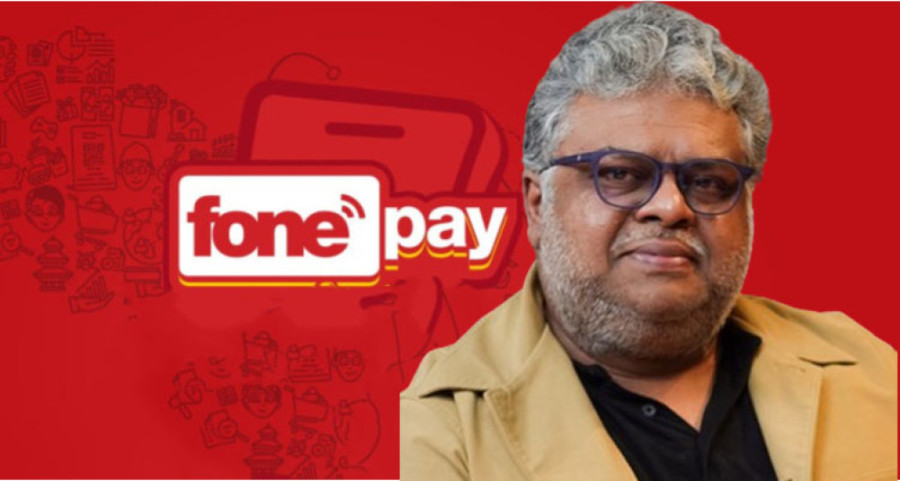Money
Khetan Group joins fintech by buying stake in Fonepay
Rajendra Khetan has acquired 14 percent shares in the leading payment system operator owned by F1Soft.
Sajana Baral & Yagya Banjade
Khetan Group, one of the country’s oldest and influential industrial conglomerates, has entered the country’s digital payment ecosystem. Rajendra Khetan, chair of the group, has acquired a significant 14 percent stake in Fonepay, Nepal’s leading payment system operator, signalling the group’s aggressive push into financial technology.
According to Nepal Rastra Bank (NRB), Khetan purchased the stake as part of a larger deal in which ten investors collectively acquired 22.23 percent of the company’s shares for around Rs1.49 billion. With this, the valuation of Fonepay has reached Rs6.67 billion.
The central bank confirmed that it had approved the change in shareholding structure of Fonepay, a subsidiary of the fintech powerhouse F1Soft. “The regulatory approval has been granted, and administrative processes are being completed before formal notification to all parties,” said an NRB source.
While Khetan himself has purchased 14 percent share, his affiliate company, Rapid Investment, has acquired an additional one percent. Other buyers include Nepal Impact Fund One (2 percent), Nepal Infrastructure Fund (1 percent), Nepal Impact Global Equity Fund One (1 percent), Sweda Investment (0.5 percent), Laxmi Micro Investment (0.5 percent), DJ Shrestha (0.07 percent), GGC Investments (0.3 percent) and Parsa Holdings Pvt Ltd (2 percent).
The shares sold include 14.37 percent previously held by F1Soft and 8 percent owned by IT entrepreneur Asgar Ali, who was among the company’s early investors.
For Khetan, this latest move consolidates his growing presence in Nepal’s financial sector. He recently purchased 5.21 percent promoter shares in Laxmi Sunrise Bank for Rs1.26 billion, raising his total ownership in the bank to 7.5 percent. His portfolio already spans insurance, mutual funds, venture capital and banking.
In recent years, the group has divested from traditional industries to focus more on financial services. It sold its longstanding stakes in Gorkha Brewery and Carlsberg India in order to redirect capital into banking and fintech.
“Investing in Fonepay is a natural extension of our strategy. Digital banking is the future of financial inclusion,” said Khetan. “We aim to use technology to reach marginalised communities who remain outside the formal banking system.”
He stressed that over seven million demat accounts have already been opened in Nepal, suggesting people are ready for digital financial services beyond stock trading. “Our goal is to provide every kind of financial service—from savings to investments—through mobile apps, without requiring physical presence,” he said.
Since securing its NRB license in February 2020, Fonepay has established a near-monopoly in digital transactions. Company data show that 92-94 percent of QR payments in Nepal are processed through its platform. On an average day, Fonepay handles 1.8 million transactions worth Rs18 billion. Of these, 1.3 million are QR payments and 500,000 are interbank fund transfers.
Fonepay's parent company, F1Soft, has been steadily expanding into adjacent verticals—such as eSewa, Foneloan and Fonepoints. “The sale was necessary to raise capital for these new ventures,” said Subash Sharma, F1Soft’s co-founder. “We need resources to grow these verticals into platforms as large as eSewa.”
This is not the first time Fonepay’s shares were up for sale. Three years ago, F1Soft had signed a memorandum of understanding with Dolma Impact Fund to sell a 20 percent stake at a valuation of Rs2 billion. However, the deal was cancelled after the central bank insisted on prioritising domestic investors over foreign ones.
“The International Finance Corporation (IFC) had also shown interest at that time,” said an NRB official. “But regulatory provisions restricted foreign ownership in payment service providers to no more than 15 percent, unless the company was fully foreign-owned. That door is now firmly closed.”
Founded in 2018, Fonepay was registered as a public limited company from the outset, meaning it is legally obliged to go for an initial public offering (IPO). The company postponed IPO plans in 2020 and again last year due to losses. With profitability now achieved, both NRB and investors expect the company to list on the stock market soon.
Sharma acknowledged that the IPO is inevitable. “Founders cannot exit, as regulations bar them from selling shares for three years after listing. But by selling part of our stake now, we have strengthened our financial position to scale new ventures,” he said.
F1Soft, the parent of Fonepay, is backed by Subash Sharma; Sambhav Sirohiya, managing director of Kantipur Media Group and a director in Fonepay; Subash Sapkota; and Bishwas Dhakal.
Ali, an early shareholder and IT advisor to Prime Minister KP Sharma Oli, still holds stakes in F1Soft’s other businesses such as eSewa and eSewa Money Transfer, though his role has diminished over time.
With 19 commercial banks, 14 development banks, 14 finance companies, nine wallets and one microfinance institution already integrated into its network, Fonepay appears poised to remain the dominant player in Nepal’s digital finance sector.




 21.81°C Kathmandu
21.81°C Kathmandu















